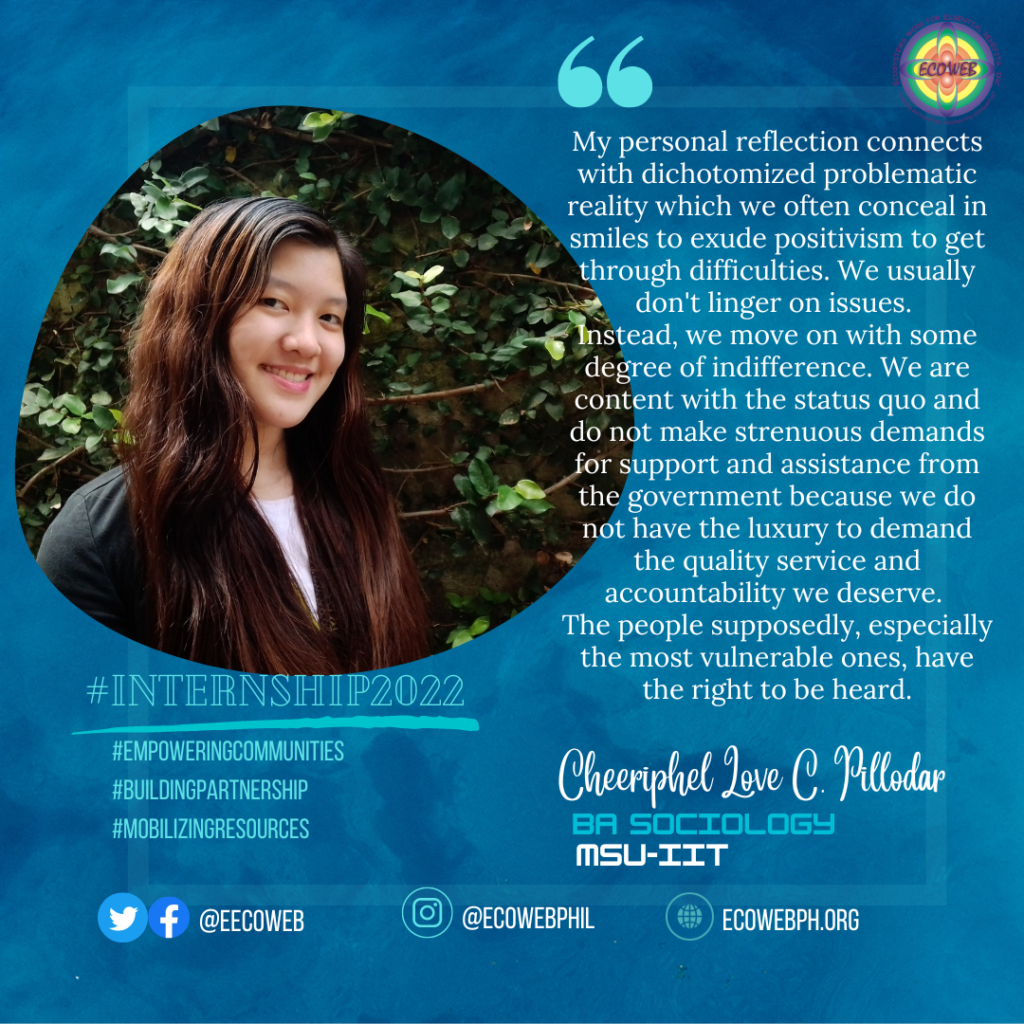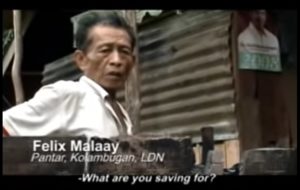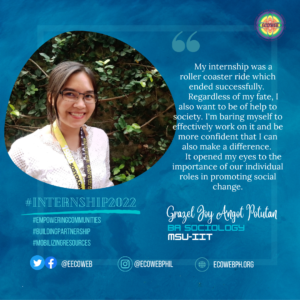By Cheeriphel Love C. Pillodar
Many things happened throughout the period of our internship. As we were the “taong-bahay,” the pandemic robbed us of the opportunity to actually experience what we learned in our virtual classrooms. The community-based experiences came constructively different, and yes, overwhelming.
Our classes taught us that the world is vast and that there are a lot of unfortunate and neglected communities out there who need help and attention. Having a contextualized grasp to diverse communities with similar economic and social realities through this internship truly brought a deep awakening.
We’ve got to hear their stories, struggles, and different points of view; see people cry out of poverty; and, see vividly in their faces how hard lives could have been and how complicated the society we live in is. On the other hand, it’s inspiring to see people still maintained optimism, are capable of bouncing back to their original state despite the devastation experienced, and are manifesting hope for a better tomorrow awaiting them.
In contrast, my personal reflection connects with dichotomized problematic reality which we often conceal in smiles to exude positivism to get through difficulties. We usually don’t linger on issues. Instead, we move on with some degree of indifference. While there is nothing wrong with doing these things, we often neglect to look for solutions to these more significant problems. We’ve come to the conclusion that there is nothing we can do but endure and wait for these problems to pass. We are content with the status quo and do not make strenuous demands for support and assistance from the government, because we are accustomed to solving difficulties on our own, or worse, because we do not have the luxury to demand the quality service and accountability we deserve. The people supposedly have the right to be heard, especially the most vulnerable ones. Ironically, access to support becomes a privilege available only for those in power or, are having better social connections. People are becoming more vulnerable and are seemingly disguising helplessness beneath the pretense of resilience.
Thankfully, there are organizations like ECOWEB which collaborate closely with the government to ease the sufferings of the Filipino people.
On the positive insight, this internship brought out the best in us. The tasks assigned to us honed our capabilities which we never knew existed. From conducting in-depth interviews with locals from various areas to writing stories and documenting activities—these skills will be beneficial for us later on when we work on our thesis.
It also improved our ability to work collaboratively, and it strengthened our relationship, which we seldom experience in online classes. All in all, these encounters would undoubtedly help us in our future careers but also in our ability to understand the world around us.
I want to emphasize that my observations during our internship were limited to the surface level. I am well aware that 35 days is not nearly enough time to learn everything about the organization, and perhaps I may have missed a point. As far as I can tell, the staff is busy almost every day, so it seems everything is done quickly. Even in the field, I noticed that community partners are hastening everything and were doing several things at once.
While I understand that it was for the benefit of the communities to receive immediate response to their needs, I was just wondering how it might affect their works’ results. There was a time during our virtual interview when one of the community partners expressed that it would have been better if they had ample time to think through their project proposal thoroughly to maximize the opportunity to improve their organization and their personal lives, as well. It was not a decision that should be taken lightly, especially if they are new to these processes.
Nonetheless, our anxiety shifted to empathy upon learning about the community’s dire socio-economic circumstances during our interviews. We almost got carried away when one of the interviewees got emotional in front of us while sharing their struggles. Being a person who has only ever seen such things on TV, in documentaries, and the like, this was truly a moving experience for me. She was out of words, but her emotions clearly conveyed how sad she was about their situation. Nevertheless, we tried to maintain our composure. The following day, after hearing all the stories, we were motivated to produce quality work for a different reason. We felt compelled to assist them and serve as an amplifier for their voices. For this reason, it was with great pleasure that we we’re able to attend the Madrasah’s turnover ceremony in Ceanuri village, where we first met the mayor of Iligan City and experienced the recipients’ genuine joy of receiving the assistance they had long sought. This was my favorite of all the tasks done.
We also noticed that ECOWEB staff are multi-tasked. At times, we couldn’t help thinking they might become confused about the information they gathered. This might be the reason of the staff’s exhaustion which may overshadow their passion in serving the community. Stress may affect the quality of their outcomes. But then again, these are just purely my personal opinions which is either right or wrong.
Their staff is obviously hardworking, thoughtful, and accommodating. They intended that we would have insightful experiences that could greatly help us. They considered the best of our interests. Also, their work is really impressive. They work to elevate people’s social standing and equip them with the resources they need to improve their quality of life. They hope that by empowering them, people become better able to take advantage of the opportunities to strengthen their communities. To put it bluntly, not everyone is given a free pass that automatically grants them access to a better life. Non-governmental organizations (NGOs) like ECOWEB raise awareness about social issues and push for systemic change.
It was truly an honor to have the opportunity to work as an intern in this organization. I could not believe it and was amazed that I was given a chance to work with genuine people whose efforts are exerted for the service of the community –to serve the underserved, to give voice to the voiceless, and to bring hope to the hopeless.
May you continue to give attention to the plight of the oppressed and the most vulnerable communities.
Thank you for being an inspiration for us to become catalysts for change. Thank you a thousandfold for your faith in our abilities. It’s been quite a ride. We had discouragements, sleepless nights, and a lot of overthinking, but I am confident that it was all worthwhile, and we wouldn’t have it any other way.
—-
(Cheeriphel Love is a BA Sociology student of Mindanao State University-Iligan Institute of Technology (MSU-IIT) who completed her 35-day internship program in ECOWEB Inc. She is one of the four interns who conducted community profiling, virtual monitoring of project beneficiaries, assisted the learning review of humanitarian intervention for vulnerable and conflict-affected communities, and produced documentations.)




![Read more about the article Fuerte de la Concepcion y del Triunfo or Fort of the [Immaculate] Conception and of the Triumph [of the Cross]](https://ecowebph.org/wp-content/uploads/2008/07/123123-1-300x222.jpg)




